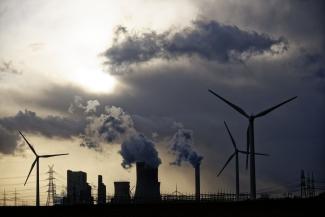Wind and solar
The right approach to catching up

In 2018, Africa’s share of the world population was about 15 %, and its share of global carbon emissions was a mere four percent. The difference shows the continent’s poverty – and its need to expand energy supply.
At current trends, Africa is expected to emit 6.1 % of global carbon emissions in 2040. Thereafter the emissions of other continents will most likely decrease, but, for two important reasons, Africa’s will keep increasing: African countries must industrialise, and their populations are still growing. Nonetheless, African emissions will probably peak at below eight percent of the global total towards the end of the century.
Important changes are underway. Africa is thus well positioned for a much earlier transition to renewables than other world regions. Starting from a very low base, renewables will overtake the contribution from coal at around 2034 and from gas in mid-century. It helps that this continent has some of the most promising locations for solar, hydro and wind power generation. Moreover, wind and solar are becoming increasingly price-competitive internationally, and that will prove valuable in Africa. Technologies for electricity storage and energy efficiency are improving too.
Nuclear energy is unlikely to ever play an important role in Africa. South Africa has two commercial nuclear power plants which account for five percent of national power generation. Because of its renewable potential, high costs and the associated risks of nuclear, other reactors will probably not be built in Africa.
The transition to renewables is likely to prove most difficult in South Africa. The reason is that its energy infrastructure is firmly in place and is based on domestically produced coal. In fact, the comparatively old infrastructure means that the transition to sustainability will run into similar hurdles as in Europe and North America. Replacing old infrastructure with new facilities is more expensive and more difficult than simply building new ones. Nonetheless, the transition is necessary in the countries concerned.
Rich nations’ climate responsibility
Climate change will affect all world regions. Africa is particularly at risk in view of its low adaptation capacity. Extreme weather situations like storms, droughts and unusually heavy rains are becoming more frequent and getting worse. Harvest failure can lead to famine. Plagues are becoming more likely. Climate risks also include more intensive competition for vital resources and a greater probability of violent conflict.
The entire international community has a keen interest in preventing the worst. Africa itself, however, cannot do much to mitigate global heating given that its countries have so far not contributed much to making it happen. Though Africa can contribute to fighting deforestation and forest degradation, its future thus hinges on other nations’ action to protect the climate.
No doubt, the prosperous countries must lead. They have historically contributed most to heating up the planet. Not by coincidence, moreover, they are also the ones that can best afford to invest in climate protection.
Some leaders, most prominently US President Donald Trump, say that humans have not caused climate change. Such denialism is self-serving and short-sighted. The scientific evidence that has been compiled by the Intergovernmental Panel on Climate Change and others is very clear. To prevent even worse impacts of climate change than developing countries are already exposed to, difficult decisions must be taken.
The rich nations must reduce their consumption of fossil fuels, which means that policymakers in pollution-intensive countries must assume responsibility. After all, politics is supposed to be about leadership and not just flattering voters. Leaders should consider that many of today’s children will still be alive in 2100. Their world must not become one of environmental disaster.
Policymakers from rich countries have a habit of lecturing others about good governance. Such rhetoric would be more convincing if they themselves offered more and better examples of good environmental governance. To a considerable extent, investing in climate mitigation domestically is actually the best way rich nations can support sub-Saharan development. The more they let global heating spin out of control, the less useful their conventional official development assistance becomes. Africa can take care of itself so long as its development is not thwarted by climate disasters. It is the responsibility of the richer nations to clean up the environmental mess they have caused.
African leaders must bear responsibility too, of course. It is essential to reduce population growth and improve standards of living. Good governance and long-term planning in Africa are now more important than ever. Africa’s leadership is aware of the fundamental challenges, but so far, action has been limited. Cooperation with international development partners, including China, is needed and must be geared to sustainability.
In this context, the oil and gas reserves that several African countries have, are not really the blessing leaders may think they are. While one should expect oil prices to recover somewhat from the current crisis, they may quite well stay lower in the long run than many forecasts expected.
Oil is still the largest source of energy produced in Africa at this point. But national economies never benefited the way they should have. The countries that exploit this natural resource have always forgone income they could have generated by processing oil. Lacking refining capacities, they have to re-import fuel. It is too late to reverse things now. New infrastructure built in Africa should be based on renewables. For this reason, it also makes sense to export gas which will soon surpass oil to become Africa’s most important fossil resource.
Jakkie Cilliers is the founder and former director of the Institute for Security Studies, a non-profit organisation with offices in South Africa, Senegal, Ethiopia and Kenya. This essay is based on his book “Africa first! Unleashing a growth revolution”, recently published by Jonathan Ball (Cape Town and Johannesburg, 2020, available on Amazon).
jcilliers@issafrica.org






